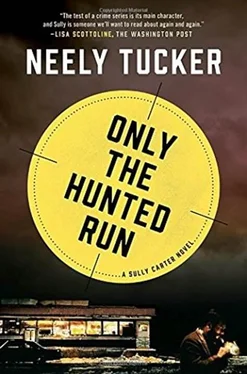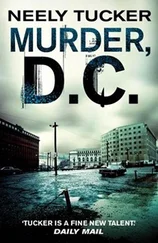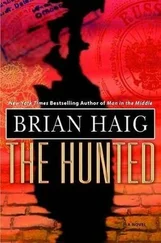He took a drink from his bottle of water, swirled it around his mouth, aware that he was displaying a monstrous chip on his shoulder, and swallowed. “So how would you explain either of us? We shouldn’t exist. Except here we sit. Ma’am.”
“It’s unusual because of his ability to plan, the escape, the poetry.”
“I already done said. He told me he wasn’t planning to escape. Walked down the hall, expecting to meet the cops, give himself up. Nobody ever stopped him, so he kept walking. Went down what he called a little staircase. Wound up with a bunch of people running out of their offices. Said they all went out what he called a side exit.”
She and Agent Chin exchanged glances and Chin reached down and turned off the recorder. They started putting papers in folders and briefcases, not bothering to tell him they were finished. R.J. and Lewis finally exhaled.
“So, Special Agent Gill,” Sully said, “you been asking all the questions. I got two.”
She did not look at Chin Man before she said, “If I can,” which confirmed his earlier impression of who was in charge, and thus allowed him to ask a better first one.
“You know of any place Waters has been since he left the res?”
“No. But it’s early.”
“You think he’s going to call me again?”
“Absolutely. That’s why we’re putting a trace on your home, cell, office. It’s why you’re going to sit by one of them until he calls.”
“Why would he?”
“That’s three.”
“Indulge me.”
She flicked him a half smile, the first she’d allowed herself the entire interview, and stood up, looping her bag over a shoulder.
“Because a Spelman grad can see you’re his loose end, Louisiana,” she said, “not to mention a loose cannon.”
THE WHOLE WAYdown in the elevator, walking back to the newsroom, R.J. was either pissing about the big-footing feds coming in the place with that attitude or riding him about popping off at them.
“You figure out she’s smarter than you yet,” R.J. said, looking over at him, “or you need me to tell you?”
“They on our turf,” Sully said, ignoring the question. “You got to pee on your trees.”
Yeah, R.J. was saying, but you can’t just go peeing on every tree in the yard, and then he was bitching about southerners and their obsession with dogs. Sully, as they made their way through the cavernous newsroom, slowly tuned him out, the place was going a million miles an hour. Everybody had been called in from home or called back from vacation, nobody fucking around. Phones rang and reporters caught it before the echo of the first ring and talked low and fast, popping open a file, phone crooked between ear and shoulder.
At home, their spouses or girlfriends or boyfriends or children gave up hope of seeing them again for days. Across the city, the manhunt and the waves of heat and humidity rolled down deserted streets. People sat in front of their televisions and stared at the nonstop coverage and listened to what the killer had done to the congressman and decided that no, no, there’d be no taking the kids out for ice cream or to the movies or anything at all until this nutjob was dead or in jail.
In the newsroom, the televisions suspended from the ceiling broadcast images of retired cops and federal investigators, the sound muted, but all of them talking about facts they didn’t have. The pundits yakked about what it all meant for the 2002 midterms. Some guy on the market floor was talking about how stocks were sliding. There was a real and actual police scanner blipping somewhere; Sully could swear he heard it.
“The daily budget, what, for today?” R.J. said, coming out of his rant, steering them to the main conference room. “It looks like a cross between D-day and a high-speed train wreck.”
And then he was off on a new rant, about how this would involve, what, how many, between seventy-five and one hundred reporters, editors, photographers, graphic designers, copy editors, layout artists, and lawyers. Reporters were moving by foot, car, taxi, and airplane. They would, he went on, correspond by email, burn up phone lines, send faxes, file FOIAs, burrow into court clerks’ offices, consult online databases, attend press conferences, consult experts, and-in a massive, strange, and somehow primitive act of coordination-all turn in stories, files, reports, and dispatches within minutes of one another, from all over the nation if not the globe, like they were a murmuration of starlings, like they were shoaling fish. They had to separate, align, and maintain cohesion while running at flat-out full speed, and then come together for a final presentation at almost the same time.
“The fuck-me part of it is,” R.J. said, coming into the conference room, plopping down in a swivel chair, “is that it’ll work. Does every time. Challenger blew up, Reagan shot, pick.”
Sully, who had neither grown up in newspapers nor ever really cared to work in one before getting hired by the Times-Pic in New Orleans, said it was some sort of professional voodoo.
“When voodoo works,” R.J. shrugged, “you leave the juju be.” He flapped his printout of “Love Song” on the table. It was annotated in red, lines and arrows here and there. “The library has the rest of Eliot. Susan, Audra, everyone else, are going over it.”
“Has Eddie decided when he wants me to write up something for the Web about the call?”
R.J. looked up, over his glasses. “I would score that one an ‘if,’ sport. Your new best friend at the FBI wants a sit-down with Eddie as to if we’re going to use that. National security, encouraging a killer, etc.”
“So why didn’t we all do that just now?”
“The director wants in on it.”
“Director?”
“Of the Feeb.”
Sully stopped looking out the window to throw a look at R.J.
“You’re serious.”
“As cancer. Sullivan, the man just infiltrated the Capitol of the United States and executed a member of Congress.”
“‘Infiltrating the Capitol of the United States’ consisted of blowing past one magnetometer with two guards. Then he ran down a hall and shot his local representative.”
“The ice picks.”
“I’m trying to block the visual, thanks.”
His stomach rolled over. Initially, he thought it was nausea. Then he remembered he had not eaten since yesterday, lunch. This morning, after the call from Waters, he had run upstairs, grabbed the small, heavy felt package holding the Tokarev from its hiding place in the closet, stuffed it in his cycle jacket, grabbed his helmet, told Josh to stay inside all day, and flew into the office on the Ducati. Now he was walking around the conference room, realizing he was in need of a shower and a burger in equal urgency. He wasn’t going to get either for a while, he thought, looking at the big-ass whiteboard where all this was being mapped out.
It was a lunatic’s scribbling of names and story assignments and headings and numbers, a lot of it in different colored markers.
There were stories assigned on Edmonds, his House career, his voting records, his youth back in Oklahoma, funeral plans, memories from colleagues, searches for ties to Waters. Did they meet at a shopping center campaign rally? Had Edmonds angered the tribe? Did Native Americans like or loathe Edmonds? Did a member of Waters’s family work for one of his businesses? Rent an apartment from a property he owned? Did Edmonds fuck his sister? Did Waters even have a sister?
There was a link, there was a tie, and somebody somewhere was going to find it. They had to be first. Had to. This story. In this town. Getting beat on this would be professional humiliation.
The board also mapped out short memorial stories on each of the victims, longer ones on the Capitol police officers killed in the line of duty. Another quadrant was devoted to Capitol security, with “own police force” and “WTF” written in huge letters, with four exclamation marks.
Читать дальше








![Джон Макдональд - The Hunted [Short Story]](/books/433679/dzhon-makdonald-the-hunted-short-story-thumb.webp)



